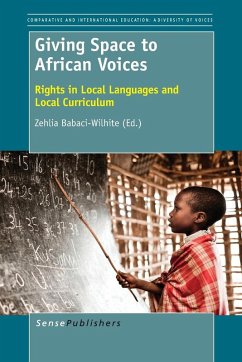This book sets out to bring voices of the South to the debate on localization of education and makes the case that it should be considered a right in education. Despite all the scientifically-based evidence on the improved quality of education through the use of a local language and local knowledge, English as a language of instruction and "Western" knowledge based curriculum continue to be used at all educational levels in many developing nations. This means that in many African countries, the goal of rights to education is becoming increasingly remote, let alone that of rights in education. With this understanding and with the awareness of the education challenges of millions of children throughout Africa, the authors argue that local curriculum through local languages needs to be valued and to be preserved, and that children need to be prepared for the world in a language that promotes understanding. The authors make a clear case that policy makers are in a position to work towards a quality education for all as part of a more comprehensive right-based approach. We owe it to the children of the South to offer the best quality education possible in order to achieve social justice. This book convincingly erases any doubt that a rupture from this historical legacy is necessary in order to counter elitism and rediscover pathways to quality education through the promotion of local languages grounded in a contextually relevant and rights based education system. The various contributions cohere into a vital read compellingly linking issues of language, power and rights in education. This compilation must be read by African policy makers, language planners, educationists and all who are concerned with human rights as well as those wanting to understand the continuing 'underdevelopment' of African societies. Salim Vally, Director of the Centre for Education Rights and Transformation at the University of Johannesburg, South Africa. In focusing on the right as well as the need to indigenize linguistic and curricular contexts in Africa education, this new book achieves the two occasionally parallel but often intersecting objectives of de-Europeanizing African schooling while at the same, clearing the deck for the decolonial re-voicing of emergent epistemic and pedagogical platforms that should constitute the sine qua non of educational well-being for the masses of this ancient continent. It is a timely, well-constructed work that should benefit students, specialized researchers, policy makers and the general public inside and outside Africa. Ali Abdi, Professor of Education and International Development at the University of Alberta, Canada. As we move towards defining the Post 2015 education and development agenda, it is critical that we revisit the issue of "Right for quality education for All". It is refreshing to know that through this book Zehlia Babaci-Wilhite and other colleagues are putting the use of the African languages and cultures of the learners and their communities as at the center of the policies geared towards promoting access to quality education to all African learners. I recommend "Giving Space to Africa Voices: Rights in Local Languages and Local Curriculum" to all policy makers and practionners engaged in the Post 2015 Education debate. Professor Hassana Alidou, Director and Representative UNESCO Regional Office Abuja, Nigeria.
Hinweis: Dieser Artikel kann nur an eine deutsche Lieferadresse ausgeliefert werden.
Hinweis: Dieser Artikel kann nur an eine deutsche Lieferadresse ausgeliefert werden.








